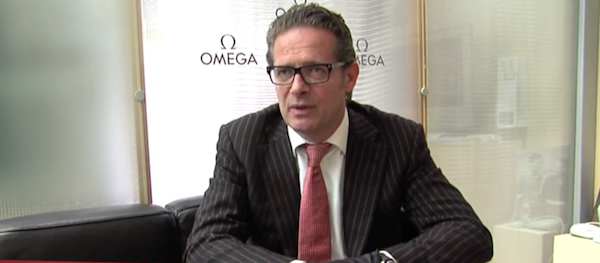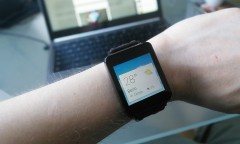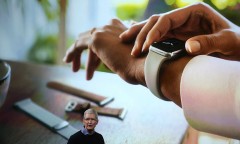By Vishal Goel, | November 25, 2016

Jean-Claude Monachon, Omega's vice-president, at the annual BaselWorld fair. (YouTube)
Swiss watchmaker Omega is facing a big threat from the new smartwatch industry, like other luxury watch brands. According to a study by Bloomberg, Swiss watches reported a decline in the demand by around 16 percent this October, the biggest in the past seven years.
Omega, which has been the official timekeeper at the Olympics since 1932 and the first brand to land on the moon, wears the medal of a long, proud history. Even James Bond ditched the Rolex Submariner for the Omega Seamaster to become its ambassador.
Like Us on Facebook
Omega came out with the Omega Globemaster last year at the annual BaselWorld fair, a watch that boasts of the world's first master co-axial chronometer movement, arguably the most accurate and precise movement till date.
This new era of smartwatches is certainly not the first time Omega is facing a crisis. In the 1970s, Omega was at the top when it was hit the worst by the quartz movement and was subsequently acquired by the Swatch Group. The advent of Japanese electronic watches left people concerned about the future of mechanical watches.
In a recent interview, Jean-Claude Monachon, Omega's vice-president for product and customer service, talked about the recent developments as well as the future of the watch industry and potential threats from smartwatches.
Monachon, who has been in the watch business for almost 37 years (19 of which he has spent at Omega), claims that he has products planned till 2020 with a new product coming out every three months. According to him, it all depends on customer service. When customer service is exceptional, and people continue to connect to the mechanical watches emotionally, Swiss watchmakers like Omega will continue to hold their stand in the industry.
Omega, which depends on mechanical watches for 70 percent of its turnover and 30 percent on quartz watches, has its biggest market in China, followed by the US and Hong Kong.
Commenting on the new smartwatch industry, Monachon remarked on the eventual obsoleteness of the technology giving examples of the early versions of iPhones and IBM computers.
"I could imagine a smartwatch as an accessory in a bracelet, but not as a replacement for the mechanical watch. It has no soul. I have friends who have bought Apple watches. But they are already in the drawer. It is like a phone. I might not have the same phone the next year. You can't do anything with them. But our pie pan dial will never get old," said Monachon.
-
Use of Coronavirus Pandemic Drones Raises Privacy Concerns: Drones Spread Fear, Local Officials Say

-
Coronavirus Hampers The Delivery Of Lockheed Martin F-35 Stealth Fighters For 2020

-
Instagram Speeds Up Plans to Add Account Memorialization Feature Due to COVID-19 Deaths

-
NASA: Perseverance Plans to Bring 'Mars Rock' to Earth in 2031

-
600 Dead And 3,000 In The Hospital as Iranians Believed Drinking High-Concentrations of Alcohol Can Cure The Coronavirus

-
600 Dead And 3,000 In The Hospital as Iranians Believed Drinking High-Concentrations of Alcohol Can Cure The Coronavirus

-
COVID-19: Doctors, Nurses Use Virtual Reality to Learn New Skills in Treating Coronavirus Patients











